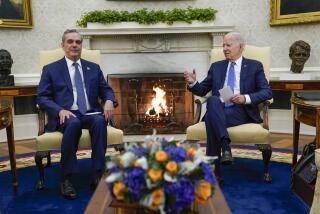Sen. Bradley Offers New Plan to Ease Latin Debt Crisis
WASHINGTON — Sen. Bill Bradley (D-N.J.) on Wednesday proposed lower interest rates and a partial debt writeoff as a more effective way to rekindle economic growth in Latin America than a less radical plan initiated by Treasury Secretary James A. Baker III.
Bradley, testifying before the House Foreign Affairs subcommittee on international economic policy, advocated a one-shot, 3-percentage-point cut in interest rates on Latin American loans, coupled with an annual writeoff of 3% of principal for three years when debtor nations show progress in economic growth.
Renewed growth in Latin America is needed not only to ward off default but to recover 1.4 million U.S. jobs lost in the hemisphere’s recession since 1981, Bradley warned.
Treasury Official Pessimistic
But David C. Mulford, assistant secretary of the Treasury, told the panel that the commercial banks holding Latin nations’ debt could not afford Bradley’s proposal. A 3-percentage-point interest cut would, in some cases, bring the rate below the banks’ cost, Mulford said.
“That’s a pretty sharp reduction and not something to be shrugged off,” Mulford said. “The stock market wouldn’t shrug it off, depositors wouldn’t shrug it off, and you would have, I think, a quite serious situation.”
U.S. commercial banks hold about $24 billion of Mexico’s $98-billion foreign debt and a similar proportion of other Third World loans.
When questioned by Rep. Don Bonker (D-Wash.), chairman of the subcommittee, Bradley conceded that banks may have little enthusiasm for his plan.
“But, if you’re president of a bank, you’d also have to weigh the possibility of a stockholder’s suit to determine whether loans you are carrying at 100% are falsely represented because they are selling at 70% in secondary markets,” he said.
Bradley also urged new loans to debtor nations aimed exclusively at stimulating growth rather than helping to service old debts. The trouble with the measures proposed by Baker last year, the senator said, is that they stress repayment rather than growth.
He estimated the cost at $28.8 billion for the one-shot, 3-percentage-point interest cut on commercial and U.S. government loans to Latin American nations, $28.8 billion for the first year’s writeoff of principal and $3 billion for new loans through multilateral institutions.
But, asked if even the adoption of his program would be enough, Bradley conceded that a “solution is probably a larger package, but you can turn the corner with the package I’m suggesting.”
In another House subcommittee hearing Wednesday, Elliott Abrams, assistant secretary of state, hinted that U.S. economic aid to Chile may be withheld unless the military government there makes “positive changes” to improve human rights.
Abrams told the Banking Committee’s international development subcommittee that how the United States votes in October on a $250-million World Bank loan to Chile “will depend a great deal on what happens in Chile between now and then.”
Times staff writer Laralyn Sasaki also contributed to this story.
More to Read
Sign up for Essential California
The most important California stories and recommendations in your inbox every morning.
You may occasionally receive promotional content from the Los Angeles Times.










